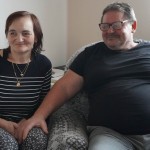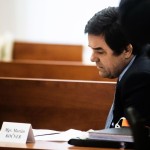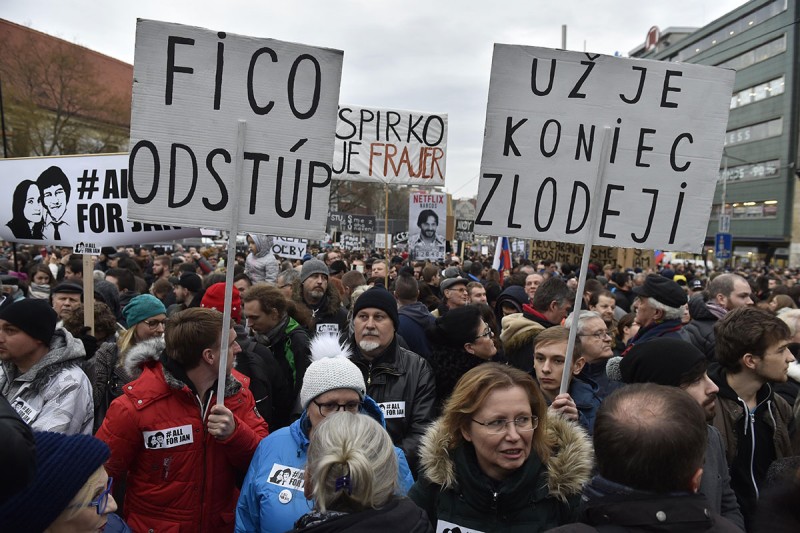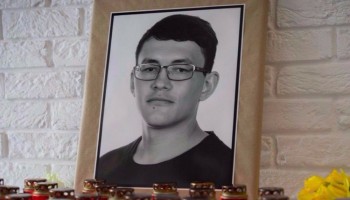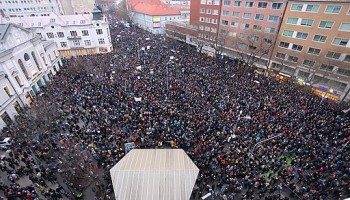On February 21, 2018, at exactly 8:21pm, Slovakia changed forever.
Ján Kuciak, a young investigative reporter, and his fiancée, Martina Kušnírová, were drinking coffee in their home in the small Slovak village of Velká Mača when a man knocked on their front door wielding a 9mmn Luger.
Within seconds, both were shot dead: Ján crumpled on the basement stairs, Martina in the kitchen.
The two were murdered at the unbearably young age of 27. Their deaths — widely connected with Ján’s work to expose corruption — inspired the biggest protests in Slovakia since the fall of communism.
The ruling party fell, but that was just the first domino. Evidence secured in the murder probe led to new investigations. In the past four years, thirteen judges have been charged with obstruction of justice and corruption. One police president committed suicide, a second is under investigation, and a third — the one who initially oversaw the murder case — has been charged with heading an organized criminal group.
But the arrests do not mean that all is well. A special court trying Ján and Martina’s murder found the lead suspects — including Marian Kočner, the notorious businessman accused of masterminding the crime — not guilty due to lack of evidence. And none of the arrested judges or police officials have gone to trial, let alone been sentenced. Voices from the reform movement are conflicted on how to move forward: Though Slovakia’s politics have changed, the country’s new leaders have not fulfilled the people’s hopes. The ugly face of the old system, many say, is trying to stage a comeback.
“The murder of Ján Kuciak and Martina Kušnírová brought hope to Slovak society,” says sociologist Michal Vašečka. “It existed for two years. But the new prime minister and the COVID situation flushed the hope down the sewer.”
“We Never Chose This”
In 2018, in the weeks and months after the murder of their children, the Kuciak and Kušnírova families were asked by organizers of anti-corruption demonstrations to speak out. Their challenge was not only to mourn, but also to gather the courage to speak in front of tens of thousands of people.
“We never chose this,” Ján’s father Jozef said.
“I never would have done it. But I felt I had for Martina, my daughter,” recalls Zlata Kušnírova. “So I went to the protests and talked to the huge crowds. I cried so much I couldn’t even read my prepared words, so I just spoke from my heart.”
The families received letters of support, but were also targeted by strange acts of hatred.
Someone repeatedly vandalized the flowers laid on Martina’s grave.
“It drove me crazy,” her mother said. “So I put a sign on the doors of a local shop, ‘If you want to talk to me, let’s please talk. If you don’t have flowers, I will buy you some. And if you need a vase, I’ll lend you one of mine. Please leave Martina’s grave untouched, she never did anything bad to you!’”
“Once, I received a letter that my son was a CIA agent. It was anonymous,” said Jozef Kuciak. “I tore it to pieces and threw it away. It was bullshit.”
The Kuciak family lives in a small village in the hills of northwest Slovakia. When reporters visited their home in 2018, the garden was covered in snow. Behind the front door sat two big boxes of candles.
“Every day I visit the grave of my son,” said Ján’s mother Jana, pointing to the candles. “It’s four kilometers there and back. If there is no one to take me by car, I walk or ride a bike. I must go there every day, no matter what.”
Since that first visit, the house has been remodeled. In the corner, where there used to be a wooden stove, hangs a small memorial with photos of Martina, Ján, and the journalism awards he posthumously received.
Finding the Killers
Initially, neither family believed that their child’s murder would be properly investigated.
Nor did Peter Juhás, the young policeman appointed to lead the investigation. “It was obvious from the crime scene that the assassination was committed by a professional,” he said. “We thought it could be a professional killer from abroad, no longer in Slovakia.”
But in Spring 2018, Juhás got the feeling they were close to a homegrown culprit.
“I can recall the moment, probably in March or April, when I told one of the lawyers: ‘my intuition says we’re on the right path, and we can really move forward in the upcoming months.’”
He was right. In September 2018, police raided several houses in a small town in southern Slovakia. Eight people were detained, three of whom were later charged with planning and carrying out the assassination. One of them, who acted as the middleman, cooperated with the police and explained how it was done. Most importantly, he mentioned the name of Marian Kočner, a businessman connected to the country’s ruling party, who was later charged with ordering the killing.
Ján had written extensively about Kočner, earning public disdain from the famously ill-tempered oligarch. In a combative phone call, Kočner even threatened to dig up dirt on the young reporter and his family. Police would later find surveillance photos of Ján and his fiance on a USB key in the oligarch’s house and connect him to the killers through text messages.
The murder trial began in January 2020. Both the middleman and the shooter confessed and received reduced sentences of 15 and 25 years respectively. Kočner, his confidant Alena Zsuzsová, and the hitman’s driver Tomas Szabo pleaded innocent. The final verdict was read in a crowded courtroom in early September 2020. The judge found the driver guilty, but acquitted Kočner and Zsuzsová of the murder charges due to lack of evidence. The victims’ families left the courtroom in tears before the judge even finished reading his decision.
The acquittals incited outrage among a public that hoped justice had returned to Slovakia.
Prosecutors and legal representatives of the families filed an appeal. In 2021, the Supreme Court sent the case back to a lower court to reevaluate the evidence.
In the meantime, Kočner was sentenced to 19 years in prison for a different financial fraud involving the forgery of promissory notes – a case that was launched by Ján’s reporting. And Alena Zsuzsová was sentenced to 21 years for her involvement in another assassination in 2010.
Their new trial for the murders of Ján and Martina will begin this spring. It will likely be merged with other charges Kočner and Zsuzsová are facing: an alleged 2018 plot, never carried out, to murder two prosecutors and a lawyer.
“According to what I know from the case file, my assassination was only in the early stage of planning,” said that lawyer, Daniel Lipšic, who was elected the head of the special prosecutors’ office in 2021. “It was postponed because it was considered risky. Then the order for Ján Kuciak’s assassination came, which was a priority for Kočner.”
If the murder cases are merged, they are expected to become much stronger, and Kočner will be likely to spend the rest of his life in prison.
A Lucky Break and a Reckoning
While searching Kočner’s properties, police collected laptops, USB sticks and even guns. But what they didn’t find was his phone. Lead murder investigator Júhas recalls an earlier missed opportunity: “In the forged promissory note case, I contacted the investigator and asked about the phone,” he said. “He told me Kočner’s lawyer took it. So we narrowly missed the chance.”
But in the end, investigators got lucky, obtaining not only one but two of Kočner’s phones. While in pretrial detention for a different fraud, Kočner entrusted a confidant with not only his phones, but also their access codes. In the end, the confidant decided to give him up, and handed these phones over to the police.
Fortunately for investigators, they contained years of messages from an encryption application called Threema that Kočner used to discuss sensitive matters with a wide range of people including judges, prosecutors, oligarchs and law enforcement intermediaries. Since investigators had the physical phones and access codes, the encryption made no difference.
But it was not only Kočner who was aware of the sensitivity of the messages. The investigation team was under pressure from some ranking officials not to include the Threema messages in the murder case file.
In the end, Júhas prevailed, and the phones and secret messages that detailed Kočner’s schemes remained in the police file. Soon, the reckoning began.
One of Kočner’s primary contacts in the Threema messages was judge Vladimír Sklenka. And one of the first cases of corruption deduced from Kočner’s phones was the two men’s relationship.
Shown the evidence implicating him, Sklenka decided to cooperate with the police. In multiple testimonies, he detailed the massive corruption taking place within the Slovak judiciary. He described the influence Kočner and his “people” had on many other judges and how his bribes worked.
In March 2020, the police launched operations “Storm” and “Thunderstorm.” Officers detained an additional sixteen judges and six other alleged accomplices. Four of them confessed; the others will be tried this year.
The Dragnet Goes Wider
Even as the corrupt judges fell one by one, Slovaks who came onto the streets in the wake of Ján and Martina’s murders had enabled another cleaning house: this time in the police force.
The country’s embattled police president, Tibor Gašpar, aggressively resisted his ouster but was finally forced to resign several months after the murders in response to massive public pressure.
With him gone, the police began to investigate their own upper echelons, launching operations “Purgatory” and “Judas” in November 2020. Senior leaders were arrested and charged with corruption, money laundering, and abuse of power.
Some top law enforcement officials were even accused of being on the payroll of the Takáčovci, a known organized criminal group.
According to investigators, they had been in league with Norbert Bödör — a notorious businessman, MMA coach, and Kočner associate — who paid them in exchange for various services.
Among these was accessing otherwise restricted police databases — including to find information for Kočner about Ján that was allegedly used to plan his murder.
Štefan Hamran, the new police president, says this group could almost be described as the country’s most powerful criminal gang.
In sum, three consecutive police presidents were charged with corruption. One committed suicide in jail when awaiting trial.
Hamran says he’s determined to clean house. His first step after taking office was to call the Kuciak and Kušnírová families and apologize on behalf of the police for having failed to protect their children.
His second step was to fire law enforcement officials he considered pillars of the old system and replace them with people he trusts. But the old guard fought back, as some internal police inspectors, charged with preventing abuses of power, began to use their authority to go after Hamran’s allies. The media started to talk about an emerging “war” within the police.
The conflict is not yet resolved, but fourteen officials have been charged with corruption, nine have confessed and began to cooperate, detailing the extent of the rot within the police force.
“If the government doesn’t fall,” Hamran says, “I’m sure we can finish reforming the police from top to bottom.”
The corrupt system the top police officials created could not have functioned without the help of prosecutors — and a top leader was soon also caught.
Dušan Kováčik, a longstanding special prosecutor who was in charge of going after corruption and other large-scale criminality, was indicted for participating in the organized criminal group.
When police detained him, he had an envelope with €20,000 in cash in his breast pocket. Kováčik was found guilty and sentenced to 14 years in prison for taking a €50,000 bribe from a mafia group. He has appealed his conviction.
Meanwhile, his replacement has been named: Daniel Lipšic, the lawyer who had represented the Kuciak family during the investigation of their son’s murder. He is widely viewed to be a personal enemy of Kočner, frequently featured in his Threema messages — and was the target of an alleged assassination attempt.
A Fall — And a Comeback?
For 12 years, the ideologically diffuse SMER had been Slovakia’s most powerful political party. Tainted by scandal after scandal, it is accused of having enabled the nepotism, clientelism, and corruption that Ján had been investigating — and that enabled his and Martina’s murders.
Those killings ended up finally shaking SMER’s hold on power. Tens of thousands took to the streets demanding the resignation of Robert Fico, the country’s prime minister. People hoped that change was possible if only they demanded it.
“The murders of Martina and Ján had such an impact on Slovak society because it was just the last drop — the last drop into a pot that was already full,” said Vašečka, the sociologist.
In March 2018, a month after the murders, Fico and his cabinet resigned. SMER’s candidates were also defeated in EU parliamentary elections, and its presidential candidate lost in Slovakia’s national election.
In 2020, a populist opposition party led by businessman Igor Matovič took power, promising to “fight corruption” and “let the police investigate.”
But Matovič and his party had no experience in governance. Pandemic regulations, coalition infighting, and undisciplined comments on social media soon took a toll.
“He absolutely does not understand politics,” says sociologist Vašečka. “I don’t remember anyone, other than the intellectuals of December 1989, who were as unprepared to rule as he was.”
While handing his resignation papers over to the president, Fico had said ominously that he was “not going anywhere.”
But what once seemed unthinkable now appears to be a real possibility. The once-discredited SMER has risen in the opinion polls, placing it in second-place after Hlas, a spinoff party of its own former members.
Political Scientist Erik Láštic believes that the old system can still fight back.
“This was not only a small group of judges or prosecutors or policemen,” he said. “The system had deep roots. Even though at the beginning there was a feeling the old system is finished, the story is much more complicated.”
Slovakia’s next election is scheduled for 2024, but infighting within the governing coalition means that an early vote is possible.
“If you asked me two years ago,” Láštic said, “I would say that SMER is done. ... Actually, I don't know what happened. It is a fascinating story of resurrection.”
Four years after Ján and Martina’s murder, the system that enabled their killing could be on the verge of a comeback.
Ján’s father sees the return of SMER as real.
“Everything is possible here. People here have a short memory. How could SMER’s ratings grow — after all of this? What happened?”

